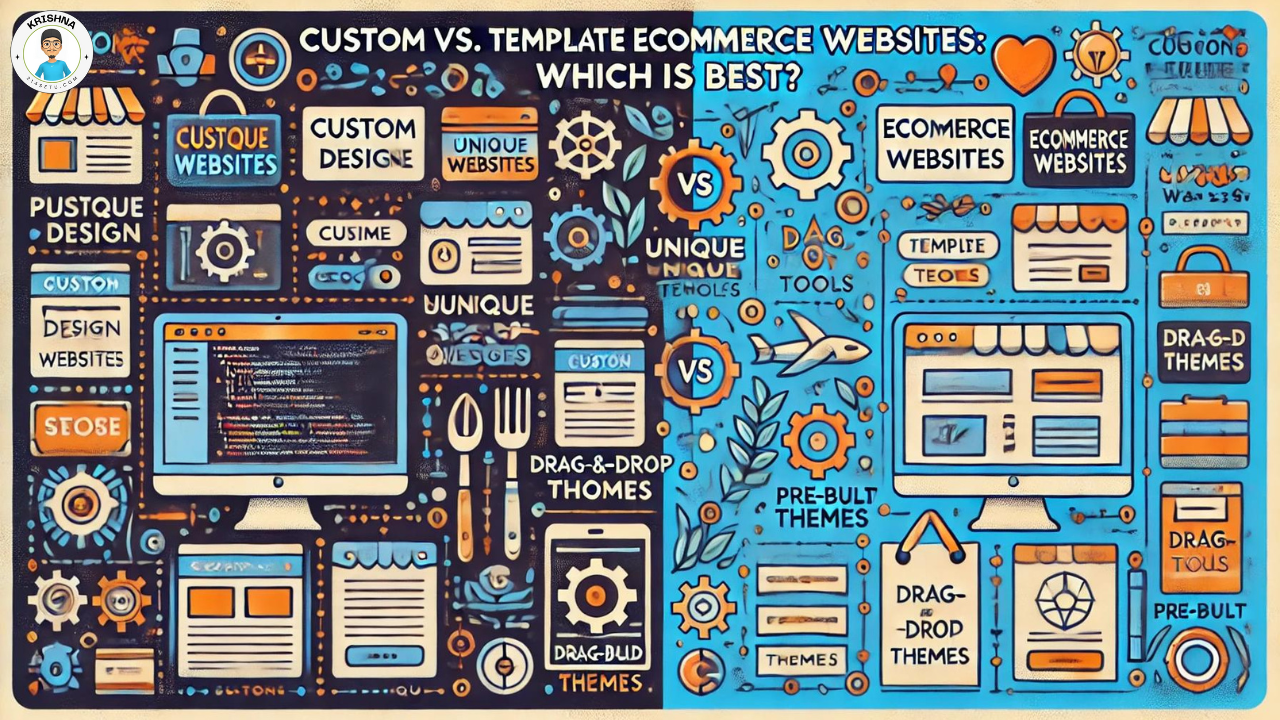
When launching an ecommerce website, one of the critical decisions you’ll face is choosing between custom and template-based development services. Both options have their pros and cons, and the best choice depends on your specific needs, budget, and long-term goals. This article will help you understand the differences and determine which is right for your business.
Custom Ecommerce Website Development: Tailored to Perfection
Advantages
Tailored to Your Needs Custom websites are built from scratch to meet your specific requirements, ensuring that all features and functionalities align perfectly with your business goals.
- Example: If you need unique functionalities like a custom product configurator or advanced filtering options, a custom-built site can deliver exactly what you need.
Scalability Custom sites are designed to grow with your business. As your business expands, the website can be easily scaled to accommodate increased traffic, more products, and additional features.
- Example: A custom site can be built with a robust architecture that supports future growth without compromising performance.
Unique Design With a custom site, you have complete control over the design, ensuring your website stands out from competitors.
- Example: You can implement a distinctive brand identity that reflects your business’s personality and appeals to your target audience.
Enhanced Security Custom development allows for the integration of advanced security measures, reducing the risk of breaches and ensuring customer data protection.
- Example: Implementing custom security protocols can help safeguard against specific threats relevant to your business.
Disadvantages
Higher Cost Custom development is generally more expensive due to the time and expertise required.
- Example: Costs can range significantly based on the complexity of the site, often running into thousands of dollars.
Longer Development Time Building a custom site takes more time compared to using a template, potentially delaying your launch.
- Example: A custom ecommerce site can take several months to complete, depending on the project scope.
Template-Based Ecommerce Website Development: Quick and Affordable
Advantages
Cost-Effective Templates are significantly cheaper than custom development, making them ideal for startups and small businesses with limited budgets.
- Example: Popular platforms like Shopify and WooCommerce offer affordable templates that can be customized to some extent.
Quick to Launch Template-based websites can be set up and launched much faster than custom sites, allowing you to start selling sooner.
- Example: You can have a functional ecommerce site up and running in a matter of days or weeks.
Ease of Use Templates often come with user-friendly interfaces and built-in features, making it easier for non-technical users to manage and update their sites.
- Example: Drag-and-drop builders and pre-built themes simplify the setup process.
Wide Range of Options There is a vast selection of templates available, catering to various industries and design preferences.
- Example: Platforms like ThemeForest and TemplateMonster offer thousands of ecommerce templates to choose from.
Disadvantages
Limited Customization While templates can be customized to a degree, they often lack the flexibility of a custom-built site.
- Example: You might be restricted by the template’s structure and design options, making it hard to implement unique features.
Scalability Issues Template-based sites may not handle significant growth as well as custom-built sites, potentially requiring a future upgrade to a custom solution.
- Example: High traffic volumes or complex functionality might lead to performance issues on a template-based site.
Generic Look Using a template can result in a site that looks similar to many others, making it harder to stand out in a competitive market.
- Example: Many businesses using the same popular templates can make your site look less unique.
Potential Security Risks Templates may not offer the same level of security customization as a bespoke site, potentially leaving vulnerabilities.
- Example: Widely-used templates can be targeted by hackers more frequently.
Which is Right for You?
Consider Custom Development If:
- You have a larger budget.
- You need specific features and functionalities.
- You want a unique design that stands out.
- You anticipate significant growth and need scalability.
- Security is a top priority.
Consider Template-Based Development If:
- You have a limited budget.
- You need to launch quickly.
- You prefer a user-friendly, manageable setup.
- You are starting small and can upgrade later as needed.
Conclusion: Making the Right Choice for Your Ecommerce Future
Choosing between custom and template-based ecommerce website development depends on your business’s specific needs, budget, and future goals. Evaluate your priorities and resources to make an informed decision that will best support your online business’s success. If you need a highly tailored, scalable solution with advanced security, custom development is the way to go. For a cost-effective, quick-to-launch option, a template-based approach might be more suitable.214setu
FAQs
- Why should I choose custom development for my ecommerce site?
- Custom development provides tailored features, scalability, unique design, and enhanced security.
- What are the benefits of using template-based development?
- It is cost-effective, quick to launch, easy to use, and offers a wide range of design options.
- Can I switch from a template-based site to a custom site later?
- Yes, many businesses start with a template and upgrade to a custom solution as they grow.

